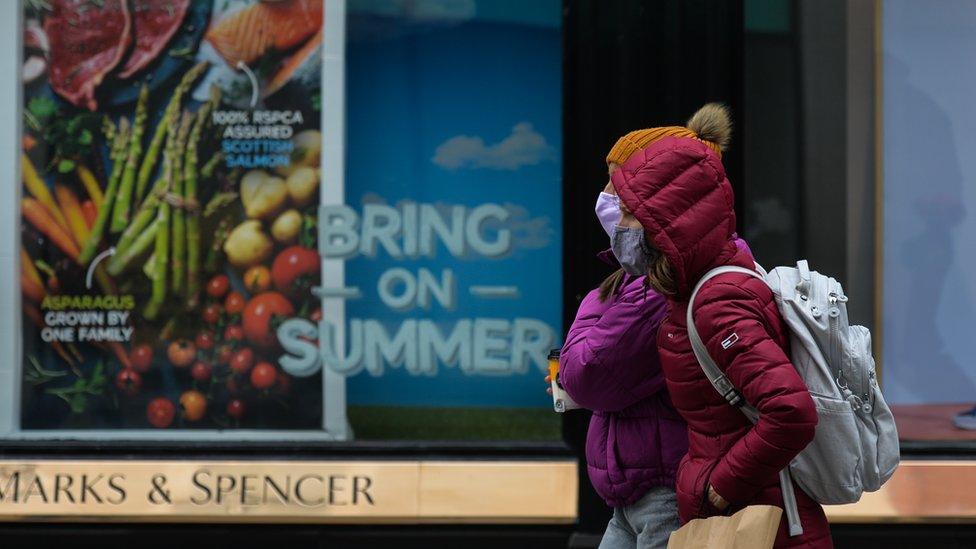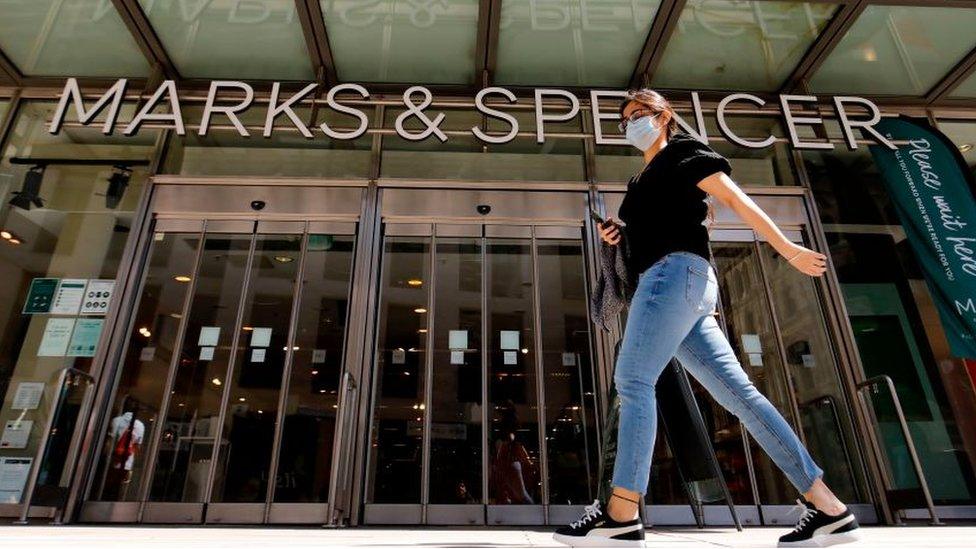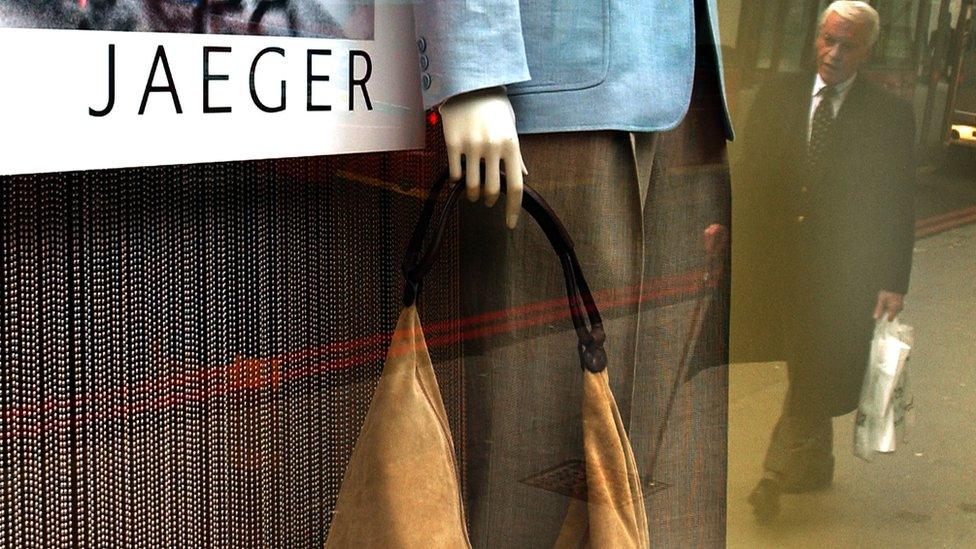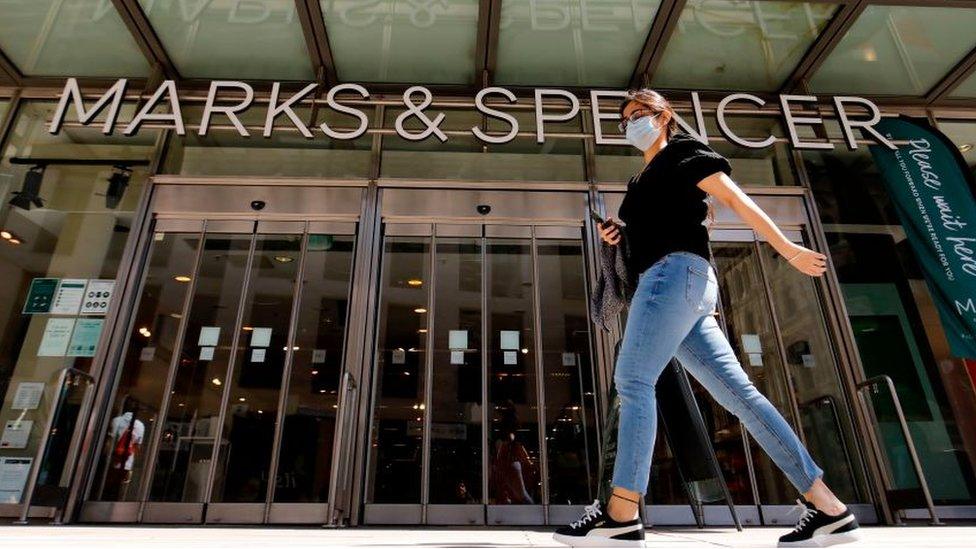M&S to close 30 more shops as Ocado deal pays off
- Published
- comments

Marks & Spencer has said it plans to close another 30 shops over the next 10 years as part of its turnaround plan.
M&S has already closed or relocated 59 main stores, as well as cutting 7,000 jobs across stores and management.
The chain has reported big losses for last year as the pandemic took its toll on clothing sales.
But food sales were up thanks to its Ocado tie-up, contributing to "a resilient financial performance in a year of disruption".
M&S made a pre-tax loss of £201.2m in the 52 weeks to 27 March, down from a £67.2m profit in the previous year.
The High Street stalwart currently has 254 full-line stores, selling clothing, homewares and food. It says that a number of them are in long-term decline and cannot justify future investment.
About 30 stores will gradually close over the next decade, while another 80 will be moved to better locations or merged with nearby shops.
The group will open 17 new or expanded main stores over the next two years, including a number of former Debenhams sites.
"We are committed to stores and believe they can be a true source of competitive advantage," chief executive Steve Rowe told investors and journalists on a conference call.
"But they need to be the right stores, in the right location, with the right services."
Clothing woes
After accounting for one-off restructuring costs, the business made a profit of £41.6m, but this was still down almost 90% on the previous year.
The M&S losses were mainly due to the performance of its clothing division, which suffered as non-essential retail was closed during lockdown.
The 137-year-old chain said clothing and homeware sales had fallen by 31.5%, reflecting the "heavy impact" of lockdowns on stores.
"In most of this time, our operations have been severely constrained by the change in day-to-day living, the effects of social distancing and partial or full closure of large parts of our store estate," M&S said.
"This has resulted in substantial changes to the mix of products customers have bought and a wide divergence of store formats and channels."
However, M&S said clothing and home sales had been growing since reopening.
Ocado deal brings new customers
The store chain also took heart from improved figures in its food division as its tie-up with online grocer Ocado took effect.
It said food delivered "strong underlying like-for-like growth" of 6.9%, after adjusting for the closure of hospitality and the adverse impact on franchise sales.
"In a year like no other, we have delivered a resilient trading performance," said chief executive Steve Rowe.
"In addition, by going further and faster in our transformation through the Never the Same Again programme, we moved beyond fixing the basics to forge a reshaped M&S.
"With the right team in place to accelerate change in the trading businesses and build a trajectory for future growth, we now have a clear line of sight on the path to make M&S special again. The transformation has moved to the next phase."


Like many other retailers, Marks & Spencer has endured a difficult 12 months thanks to the pandemic. But there are signs in these results that the ordeal may have started to forge a stronger company, one more attuned to customer tastes and the move to online shopping.
M&S traded profitably, but posted an overall loss of £201m because of the cost of its restructuring plans. It is closing shops, laying off staff and investing heavily in the internet.
Food sales were up 7%, clothing sales down by one third, with sales in High Street and city centre outlets sharply down. One of the new online ventures, a joint venture with Ocado, is proving a success. One quarter of every Ocado delivery is now M&S products, and the partnership contributed £78m of profit.
Investors liked the idea of a revival plan at M&S that for once seems to have some bite: the shares were up 4% at 162p in early trading.

M&S said it had received government support of £306.1m, which had partly offset the effect of lost trade and enabled it to keep its employees on.
"The figures show the catastrophic effect the pandemic has had on business with retail stores on the High Street," Catherine Shuttleworth, founder of retail consultancy Savvy Marketing, told the BBC's Today programme.
"There is some glimmer of hope as we come out of it, but it's one of those years that we can't draw too many conclusions from, because it's been so unbelievably different and something that no retailer could have reasonably planned for."
But she added that "real benefits" were starting to come from the M&S turnaround programme.
"Ocado's driven an awful lot of income and is really introducing a whole new group of shoppers to M&S and there's never a better time than to tie up with a food delivery business than during a pandemic," she added.
Related topics
- Published11 March 2021

- Published8 March 2021

- Published11 January 2021

- Published4 November 2020
